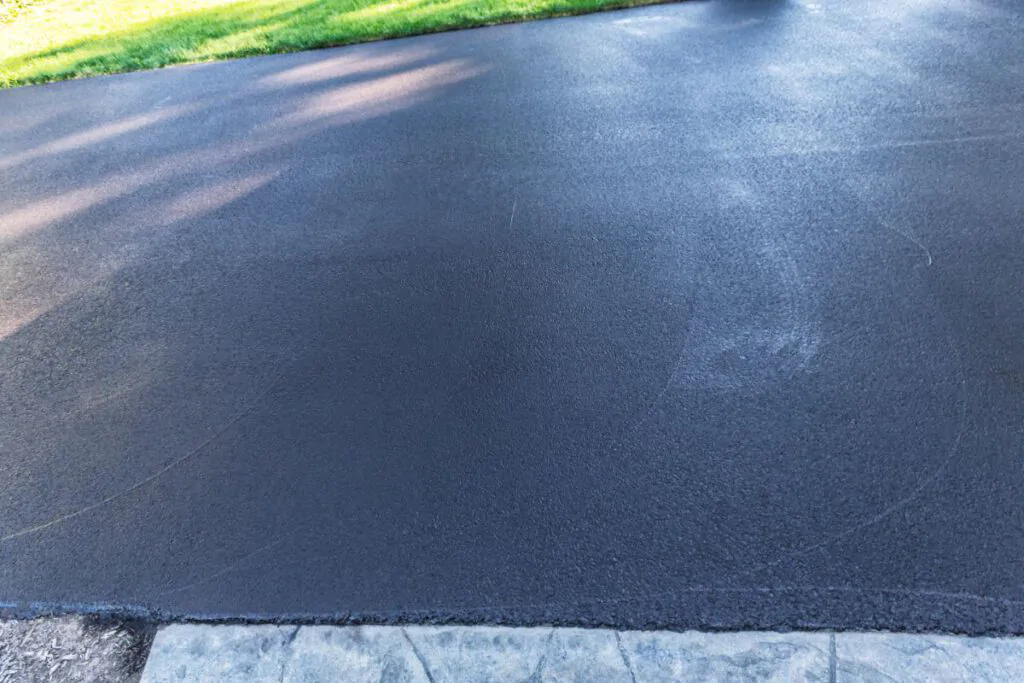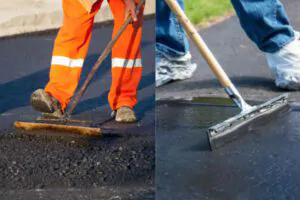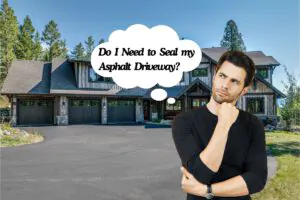Driveway Maintenance: How Often Should You Reseal?
Your driveway is the red carpet to your home, impressing guests and holding up against the relentless tread of tires day after day. But even the toughest surfaces need a little TLC to stay at their best.
I’m here as your guide, bringing over a decade of experience in maintaining and enhancing residential curb appeal. From asphalt warriors to concrete champions, I’ve seen firsthand how vital regular sealing is – it’s not just about aesthetics; it’s about preserving your investment.
Knowing when to reseal the driveway can be tricky, but don’t worry – I’ll walk you through every step of this essential maintenance ritual. Failing to reseal driveway could lead to premature cracks and potholes that could cost upwards of four times more than routine upkeep! Stay with me; you’re on the path to protecting your pavement and pocketbook like a pro.
Let’s dive in!
How to Tell When to Reseal a Driveway
It’s important to know when your driveway needs resealing. Universal signs for resealing include cracks, fading color, and water pooling on the surface.
Here are some common signs to look out for that can tell you your driveway should be resealed:
● Fading Color: If you notice a significant fade in the color of your driveway, it could be a sign that the protective sealant has worn off. Resealing will not only restore its original vibrancy but also reinforce its defenses against the elements.
● Cracks and Potholes: The development of cracks and potholes is a clear indication that the surface integrity of your driveway has been compromised. Resealing helps to prevent further deterioration, preserving the structural integrity of the pavement.
● Water Beading: Perform a simple water bead test. Sprinkle water on the surface of your driveway. If the water beads up, the sealant is still effective. However, if the water is absorbed, it’s a sign that the sealant has worn thin, and resealing is necessary to maintain optimal protection.
● Moss or Mildew Growth: Excessive water absorption can lead to the growth of moss or mildew on the driveway surface. Resealing creates a barrier that prevents water penetration, reducing the risk of such growth and ensuring a cleaner, well-maintained appearance.
● Visible Tire Marks: Heavy traffic, especially if your driveway sees frequent vehicle use, can lead to visible tire marks. Resealing not only refreshes the appearance but also adds an extra layer of protection, reducing the impact of vehicular wear and tear.
● Surface Roughness: Run your hand over the driveway surface. If you feel rough patches or inconsistencies, it indicates wear and tear. Resealing smoothens the surface, enhancing both the aesthetic appeal and the overall functionality of the driveway.
How Often Should You Reseal Your Driveway?
Experts suggest sealing your driveway every two years to maintain its appearance and longevity. This timeframe is a general guideline for both asphalt and concrete surfaces, tailored to withstand various weather conditions and wear from vehicles.
Regular resealing not only refreshes the look of your driveway but also acts as a barrier against oil spills, sunlight, and water damage.
Planning will save you time and money in the long run. Set reminders to inspect your driveway annually; this way, you’ll catch any issues early on before they escalate into costly repairs.
Resealing within this recommended frequency preserves the surface, ensuring that minor cracks don’t turn into major ones—and keeps your driveway looking great year after year.
Considerations for Asphalt and Concrete Driveways
Choosing the right time to reseal your asphalt driveway is crucial for its longevity. The materials and weather conditions they’re exposed to dictate when you should take action. Asphalt driveways often need sealing more frequently due to their tendency to crack and fade under the sun’s harsh rays.
Typically, you should plan to reseal an asphalt surface every two or three years.
On the other hand, concrete driveways are a bit different in maintenance needs. They don’t require sealing as often thanks to their durability against weathering. However, if you notice discoloration or signs of wear on your concrete driveway, it’s probably time for a fresh seal coat.
Here are more things to take note of:
Asphalt: Potential Consequences of Annual Sealing
Asphalt driveways are known for their resilience and flexibility, making them a popular choice for many homeowners. However, even durable asphalt surfaces require regular maintenance to withstand the elements. One common practice is the annual sealing of asphalt driveways. While this preventive measure aims to protect against various environmental factors, it’s crucial to be aware of potential consequences associated with excessive sealing.
Concrete: Avoiding Hairline Cracks with a Five-Year Interval
Concrete driveways offer a solid and long-lasting surface, but they are not immune to the effects of time and weather. One common concern for concrete driveways is the development of hairline cracks, which, if left unaddressed, can compromise the integrity of the entire structure.
Universal Signs for Resealing
Cracks and potholes in your driveway are clear indicators that it’s time to reseal. You might notice the color of your asphalt driveway fading or the surface of your concrete driveway starting to chip away; these signs suggest wear and tear from weather and use.
Uneven Drying: Indicator of Moisture Absorption
One of the key indicators that your driveway may be due for resealing is the presence of uneven drying patterns. Moisture absorption can occur over time, compromising the surface and leading to inconsistent drying.
Crack Assessment: Addressing Small and Large Cracks
Cracks, whether small or large, are common issues that driveways face as they endure the stresses of daily use and exposure to the elements. Regular assessments are vital to catch these cracks early on and address them before they escalate into more significant problems.
Best Practices for Driveway Resealing
Ensure to plan driveway resealing during the summer months for optimal results. Consider hiring a professional contractor with experience in driveway sealing for a hassle-free and high-quality resurfacing job.
Optimal Timing: Summer Months for Sealcoating
Summer months provide the optimal timing for sealcoating your driveway. The warm weather allows the sealant to cure properly, ensuring a durable and long-lasting finish. By scheduling sealcoating during the summer, you take advantage of the ideal temperature conditions that facilitate proper adhesion and drying of the sealer, ultimately enhancing its effectiveness.
Additionally, summer’s longer daylight hours provide ample time for the seal coat to dry thoroughly before any potential rainfall. This reduces the risk of wash-off or water damage, allowing your newly sealed driveway to maintain its integrity.
Ample drying time is crucial for preventing wash-off or water damage, ensuring that the sealer adheres securely to the surface. This contributes to the overall resilience of the driveway against potential damage.
The warmth of summer is more than just pleasant; it plays a pivotal role in the sealcoating process. The elevated temperatures ensure that the applied sealant cures thoroughly, forming a resilient protective layer over your driveway. This proper curing is essential for the sealer to achieve its maximum effectiveness in shielding against various elements.
Moreover, summer provides the optimal temperature conditions for the adhesive properties of the sealer to work effectively. The warm climate aids in the proper bonding of the sealant to the driveway surface, creating a seamless barrier that guards against the wear and tear caused by vehicular traffic, UV rays, and other environmental factors.
Therefore, choosing summer as the season for sealcoating ensures that your investment in driveway maintenance yields maximum benefits and longevity.
Similar Post: When is the Best Time to Seal Your Driveway?
Professional Assistance: Reasons to Hire a Driveway Sealing Contractor
If you lack the time, equipment, or expertise for driveway resealing, hiring a driveway sealing contractor can save you effort and achieve professional results. Experienced contractors understand the nuances of different driveway materials and can suggest the most suitable sealants for asphalt or concrete surfaces.
Here are some other reasons why to hire a professional for driveway resealing:
Cost Estimates: Average Prices for Professional Resealing
Determining the cost of professional driveway resealing involves various factors, from the size of the driveway to the type of sealing material used.
Understanding these cost estimates will enable homeowners to budget effectively and make informed decisions when considering professional assistance for their driveway maintenance needs.
Type-Dependent Rates: Asphalt vs. Concrete Sealing Costs
The type of driveway material significantly influences the cost of professional sealing services. Whether you have an asphalt or concrete driveway, each material requires specific expertise and materials for optimal results.
By understanding the nuances of material-specific sealing costs, individuals can make informed choices that align with their budget and ensure the longevity of their driveway.
Expertise Matters
Driveway sealing is a specialized task that requires knowledge of different sealing materials, application techniques, and local climate considerations. A professional contractor brings years of experience and expertise to ensure your driveway receives the most effective resurfacing treatment.
Quality Materials
Professionals have access to high-quality sealing brushes, squeegees, and sealant that may not be readily available to the average homeowner. Choosing the right sealant and using the right applicator is crucial for durability and protection against the elements. A contractor’s knowledge ensures the selection of the best-suited materials for your specific driveway type.
Cost-Effective Solutions
While it may seem counterintuitive, hiring a professional can be cost-effective in the long run. Driveway sealers often have established relationships with suppliers, allowing them to acquire materials at a lower cost. Additionally, their expertise minimizes the risk of errors that could lead to costly repairs down the road.
Proper Preparation
Achieving a flawless seal requires proper preparation of the driveway surface. Professional driveway sealers have the equipment and knowledge to thoroughly clean and prepare the surface, ensuring optimal adhesion of the sealant and a longer-lasting finish.
Customized Approach
Every driveway is unique, and a one-size-fits-all approach may not deliver the best results. Professional driveway sealers assess the specific needs of your driveway, tailoring their services to address any existing issues and provide a customized resurfacing solution.
Long-Term Benefits
A professionally sealed driveway not only enhances its appearance but also provides long-term protection against elements like UV rays, harsh weather, and vehicle fluids. This investment in preventive maintenance can extend the life of your driveway, ultimately saving you money on future repairs.
Conclusion
In conclusion, resealing your driveway every two years is essential for long-term maintenance and durability. The recommended frequency applies to both asphalt and concrete driveways, ensuring their longevity.
Opting for sealcoating during the summer months can maximize effectiveness and provide lasting protection. By hiring a professional driveway contractor, you ensure that the job is done efficiently and with expertise.
Implementing these strategies will lead to improved your home’s curb appeal and increased lifespan of your driveway. Take action today– call Donovan Sealcoating for the best driveway resealing services!




